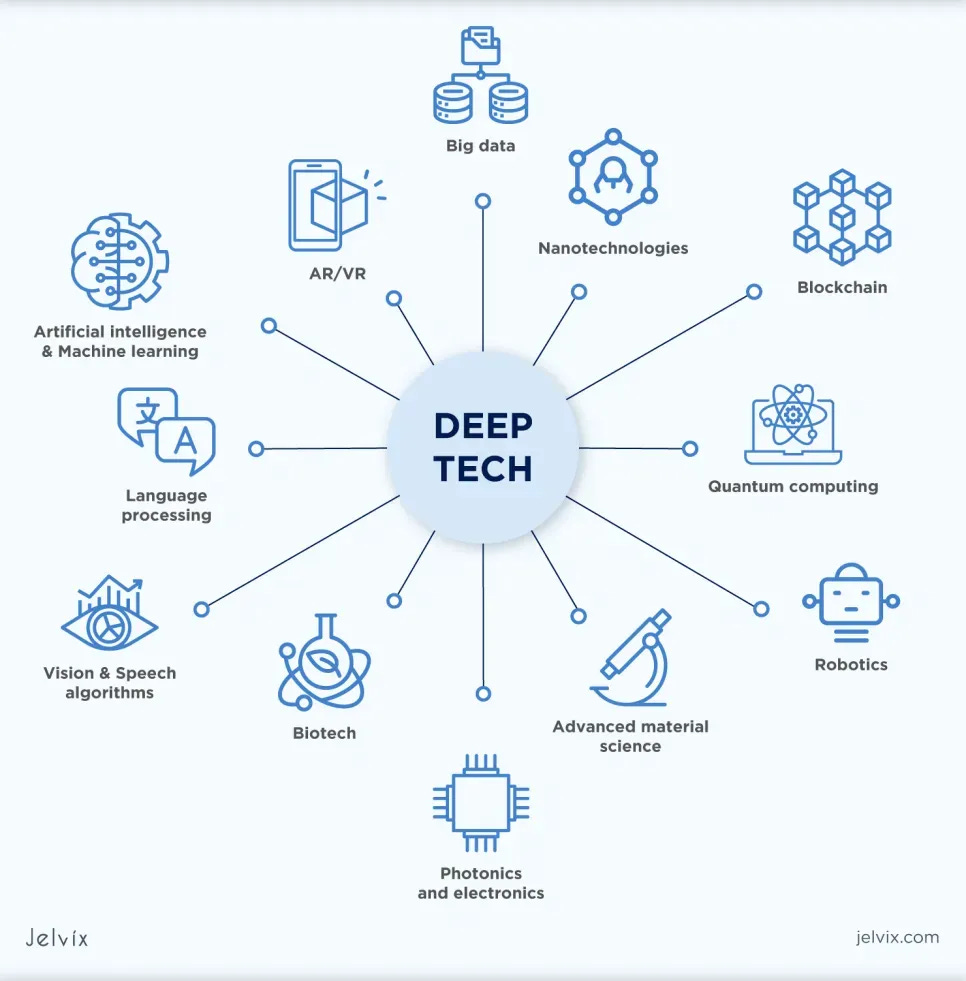The Deeptech Stack: AI, Climate & Bio Startups in 2025
How AI, synthetic biology, and climate tech startups are reshaping health, energy, and sovereignty—explore the 2025 deeptech map for founders and VCs.
Deeptech isn’t hype. It’s the new infrastructure.
While the last startup cycle optimised for clicks and convenience, today’s most urgent challenges are climate collapse, health crises, and the fragility of supply chains.
In this guest piece for The VC Corner, Koshu and Ander, from Lifetime Ventures, take us into the world of deeptech: the scientific and engineering stack rebuilding our most critical systems.
It’s where AI meets bioengineering, where food becomes programmable, and where energy isn’t just renewable—it’s resilient.
You’ll learn:
Why programmable biology and synthetic materials are redefining R&D
How AI is becoming a generative amplifier across medicine, energy, and agtech
Why sovereign tech and geopolitics are shaping which startups thrive
What smart founders are building at the edge of science and civilization
If you’re a founder building for the long arc, or a VC looking to fund it, this is the map.
Why Deeptech Startups Are Replacing the Broken Innovation Stack
For decades, innovation chased convenience. Apps optimized dopamine, not durability. We’ve manufactured unicorns on ad clicks and instant delivery, while the infrastructure of life—food, water, energy, biology—cracked beneath us.
This shallowness is now colliding with systemic failure:
Our climate is destabilizing, pressuring food systems, displacing populations, and amplifying geopolitical instability.
Our health systems are reactive, built to manage disease, not optimize flourishing.
We are confronting crises not at the surface, but at the roots: how we survive, grow, and heal.

That calls for something more foundational: deeptech.
Deeptech (also called “toughtech”) is novel scientific or engineering breakthroughs making their way into the market for the first time. But deeptech isn’t a discovery nor static; every technology we have today was at one point called deeptech, giving us semiconductor, CRISPR, renewable energy platforms, and mRNA vaccines. In short, science that rewires how we live tomorrow, not just how we consume today.
But it's still widely misunderstood: not quite pharma, not quite hardware, and definitely not another 10-minute grocery app. That is why there are common (mis)conceptions about Deep Tech:

3 Reasons Deeptech Startups Are Surging in 2025
Three seismic shifts are forcing us to reprogram the foundational code of civilization:
AI as a Generative Amplifier
We now have tools that can simulate, predict, and design complex systems: from proteins to supply chains. While we are still far from mapping out the entire world, such advances in AI collapse the cost of experimentation and accelerate the pace of insight, unlocking new frontiers in materials, medicine, and biology.Climate as an Existential Forcing Function
Climate change is no longer a future threat, it’s a present catalyst. Whether we refuse to acknowledge it or not, changing climate, or rather deviations from the climate that humanity is used to, demands that we reimagine agriculture, mobility, and energy from first principles.Geopolitical Realignment + Strategic Autonomy
Nations and regions are reasserting control over critical infrastructure. Supply chains are being shored back to own territories or allies’. Semiconductors, biomanufacturing, and food security have become matters of national security. Deeptech is no longer a stand-alone innovation, it’s sovereignty.
Key Deeptech Sectors Reshaping Human and Planetary Health

Among all the categories in deeptech, we consider that the most vital edge lies in the technologies that directly impact human and planetary health. That’s where life gets rewritten, that’s where the frontier lives.
🧫 Synthetic biology for programmable organisms
🌱 AgriFoodtech and regenerative food systems
🔋 Energy storage and materials innovation
🧠 Neurotech and longevity
☁️ Carbon capture and environmental sensing

And we can confidently argue that AI is no longer just hype; it’s helping researchers model proteins, design materials, and simulate climate pathways faster than ever. Startups are harnessing this blend of intelligence and matter to push boundaries we barely imagined a decade ago:
AI + Health = precision medicine: Nutrix
AI + Climate = smarter adaptation and resilience: Greenleaf
AI + Hardware = autonomous experimentation: Sylcast
AI + AgriFood = Precision fermentation: Kinish

Books, Podcasts, and Events Every Deeptech Founder Should Know
📚 Read: The Genesis Machine (Amy Webb & Andrew Hessel), The Coming Wave (Mustafa Suleyman), The Extended Mind (Annie Murphy Paul).
🗞 Click: MIT Technology Review, University of Cambridge Research, Nature.
🎧 Listen: Bio Eats World (a16z), The Lunar Society (Dwarkesh Patel), The Founders Project (Inc. Magazine).
🎫 Attend: Hello Tomorrow (Paris), SynBioBeta (San Jose), Deep Tech Atelier (Riga).
FAQ: Understanding Deeptech and the Future of Life Infrastructure
What is deeptech, and how is it different from traditional tech?
Deeptech (or “tough tech”) refers to startups commercializing cutting-edge scientific or engineering breakthroughs, often in areas like synthetic biology, advanced materials, AI-driven drug discovery, quantum computing, or next-gen energy systems.
Unlike traditional tech, deeptech:
Solves problems rooted in physical or biological systems
Requires longer R&D timelines and higher technical risk
Is typically IP-heavy and research-driven
Often rewires fundamental industries (e.g., healthcare, food, energy), not just interfaces
While SaaS apps optimize workflows, deeptech redefines what’s physically possible.
Why is deeptech gaining momentum now?
Three reasons:
AI lowers the cost of experimentation. Startups can simulate molecules, materials, or climate systems in silico—saving years and millions in lab work.
Climate is no longer optional. Founders and funders are shifting focus toward durable solutions as climate pressure hits energy, agriculture, and geopolitics.
Sovereignty is back. Governments want domestic control over food, chips, energy, and biomanufacturing. This is fueling demand for deeptech startups building local, resilient infrastructure.
What sectors fall under deeptech?
Deeptech isn’t a single vertical—it’s a cross-disciplinary lens. Core categories include:
Synthetic biology (programmable organisms, biofabrication)
AgriFoodTech (precision fermentation, regenerative systems)
Neurotech & longevity (brain-computer interfaces, aging science)
Energy & materials innovation (storage, fusion, rare earth alternatives)
Climate resilience (carbon capture, climate modeling)
Sovereignty tech (semiconductors, biotech, supply chains)
AI for science (autonomous labs, ML-powered R&D)
If it involves hard science, solves system-level problems, and isn’t built on ad revenue—it probably qualifies.
How does AI intersect with deeptech?
AI is a force multiplier across the deeptech stack. It's being used to:
Model proteins and design new drugs (e.g., AlphaFold, Isomorphic)
Simulate energy storage systems or climate impacts
Automate materials discovery
Enable closed-loop experimentation (lab-on-chip meets ML)
The result: shorter R&D cycles, more precise targeting, and radically faster iteration across biotech, cleantech, and hard sciences.
What makes a deeptech startup investable?
Investors look for:
Scientific novelty with commercial potential
Clear IP strategy and defensibility
Founders with domain expertise (or close ties to researchers)
Real market pull, not just cool tech
Milestone-driven paths to de-risk (e.g., grants, pilot programs, industry partnerships)
Capital efficiency in early R&D
Traction might look different—think published research, LOIs from pharma or utilities, or validation from government labs.
Is deeptech just “hardware” or “science projects”?
No—and that’s a misconception.
While deeptech often includes hardware or physical components, the best teams are blending atoms and bits: cloud-first biotech, ML-powered chemistry, synthetic biology platforms, etc.
Also, deeptech is not just science for science’s sake. These startups aim to build companies around scalable products, not just publish papers. The frontier today includes highly entrepreneurial scientists and highly technical founders.
What are examples of successful deeptech companies?
A few notable names:
Ginkgo Bioworks – platform for organism engineering
Tesla – hardware and software rethinking transportation and energy
OpenAI – foundational model research reshaping multiple industries
Northvolt – battery tech and localized energy storage
Sana Biotechnology – cell engineering and genomic therapies
Twelve – CO₂-to-chemical conversion platform
These companies didn’t just create tools—they reshaped entire categories.
Why is deeptech hard to fund?
Because it requires:
Longer time to market
Larger early capital outlay
Technical diligence (not every VC can evaluate synthetic biology or fusion)
But the upside is massive. Deeptech startups often build category-defining IP, secure non-dilutive grants, and get acquired at strategic premiums (by pharma, defense, energy, or government).
The best deeptech investors think in decades, not just quarters.
Are there funds that specialize in deeptech?
Yes—and growing. Some deeptech-focused investors include:
Lux Capital
Fifty Years
Breakthrough Energy Ventures
Deep Science Ventures
Engine Ventures (MIT)
BlueYard Capital
Hello Tomorrow’s investor network
Boost VC (space + hard tech)
LifeTime Ventures (this article’s authors)
Many of these firms combine deep technical literacy with patient capital—and actively support scientists-turned-founders.
How can founders get started in deeptech?
Steps to take:
Validate the science. Partner with a lab, research team, or university.
Apply for grants. Non-dilutive funding like SBIR, Horizon Europe, or DARPA.
Find domain-specific accelerators (e.g., IndieBio, Deep Tech Atelier, Hello Tomorrow)
Build a strong narrative around the “why now” and the problem’s systemic importance
Talk to funds that back “weird” bets with long timelines and high tech risk
Above all, think big: deeptech startups don’t win by doing more, they win by doing what no one else can.






I thought climate tech wasn’t a thing anymore ahah